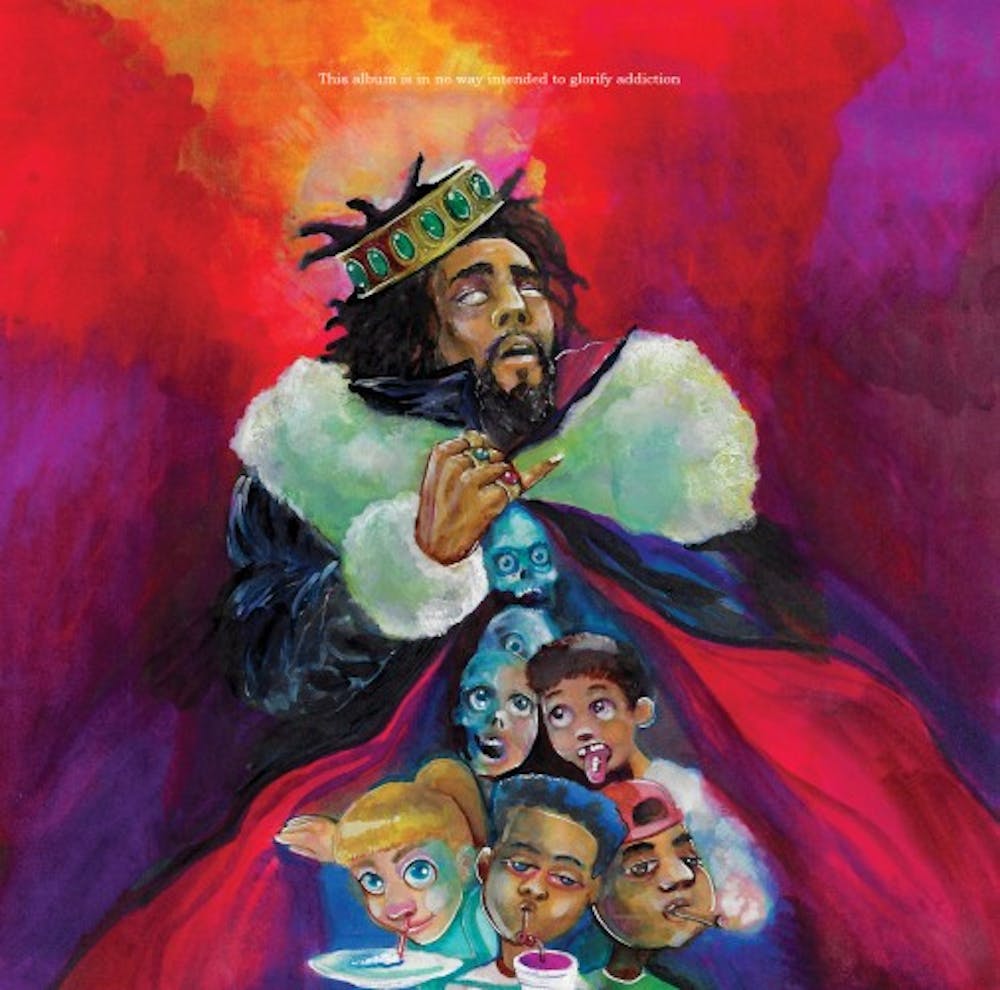Album: KOD
Artist: J. Cole
Label: Dreamville Records, Roc Nation, Interscope
Release Date: April 20
Grade: A-
To J. Cole, fame and notoriety have differing aspects that make the two terms immensely different. It is about both having something to say and how you say it, with the delivery being as important as the initial statement.
With little surprise, J. Cole has plenty to say, and he wants everyone to know it.
Coming off of arguably two of his biggest albums to date, “2014 Forrest Hills Drive” and “4 Your Eyez Only,” J. Cole has shown his proficiency to tell a story behind the mic, however consistently exploring inward rather than outward.
In a week highlighted by the announcement of two efforts by Kanye West, “KOD” seeks the spotlight unapologetically, and the album is likely to get there. Driven by pure hype alone, “KOD” broke the record for biggest opening day on Spotify, a record previously held by Taylor Swift for “Look What You Made Me Do.”
“KOD” sees the North Carolina based rapper exploring the trials and tribulations of addiction. It’s a collection of tracks that bring J. Cole’s smooth story-telling lyrics together with a polished message. J. Cole is acting as rap’s deliverer of the anti-drug message, and “KOD” is his first public service announcement.
The message permeates every aspect of the album, with the cover art containing the line, “This album is in no way intended to glorify addiction,” while also sporting an image of J. Cole with hollowed out eyes. J. Cole is visually stoic, and can be seen hovering over an array of adolescents ingesting a series of drugs.
J. Cole creates perhaps the most descriptive and vivid images with each track on “KOD.” Every track presents a multitude of layers, which Cole uses to deliver his message from a position of grandiose presentation and sublime delivery.
Album opener “KOD” brings forth a hard-hitting beat that Cole seamlessly immerses himself in. Cole picks up the pace of his delivery as the track unfolds, resorting back to the main chorus that highlights a tight snare and several backing vocals.
Tracks like “ATM” and “Motiv8” see Cole exploring the greed and addiction that comes with immense wealth, employing lyrics like “F--k it, I take the whole cake and I won’t leave a portion/ It’s only an organ” and even sampling Junior Mafia on the latter track. Cole sees money as the ultimate drug, and the limitless acumination of wealth mindset as the driving force behind that addiction.
Cole can’t hide all of his feelings for long. On “1985,” Cole initiates a story of self-reflection that soon moves towards an observation and critique of the emerging figures of prominence in rap, as if to humble them. Cole makes his presence known and wants everyone to be sure of his place among the best in the game.
In other areas on “KOD,” Cole brings tracks closer to home. “Window Pain” shows the rapper entering a reflective state in which he is conflicted between instinct and nature. Cole shows great appreciation for his success and fame, but still feels the weight of his struggles pull him further and further down.
Cole evokes feeling through rap that makes his work hard to shy away from to all. “KOD” is a statement in every sense of the word, and is a shift in Cole’s context and content without compromising artistically.
With “KOD,” Cole is taking a step towards the type of lyricism and artistry that takes rap to a level of appeal that transcends the mainstream. It’s a genre that forces to be redefined, and pushes back on the parameters of rap.
Brian Evans is the senior arts editor and can be reached at brian.evans@ubspectrum.com and @BrianEvansSpec.
Brian Evans is a senior English major and The Spectrum's senior arts editor.






